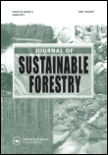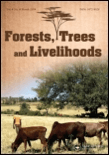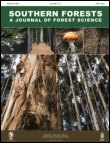
Trees Forests and People
Scope & Guideline
Empowering Research on Trees, Forests, and Their People
Introduction
Aims and Scopes
- Sustainable Forest Management:
Research on practices that promote the sustainability of forest resources while balancing ecological health, economic viability, and social equity. - Biodiversity Conservation:
Studies aimed at understanding and preserving forest biodiversity, including the impacts of human activities and climate change on various species and ecosystems. - Socio-Ecological Dynamics:
Exploration of the interactions between human communities and forest ecosystems, focusing on livelihoods, cultural practices, and community engagement in forest management. - Climate Change Adaptation:
Research on the impacts of climate change on forest ecosystems and strategies for adaptation, including carbon sequestration and resilience-building measures. - Agroforestry and Land Use Change:
Studies on the integration of trees within agricultural systems, examining their role in enhancing food security, soil health, and ecosystem services. - Forest Economics and Policy:
Analysis of the economic aspects of forestry, including valuation of ecosystem services, market dynamics, and policy implications for sustainable forest management.
Trending and Emerging
- Integrating Local Knowledge and Practices:
Emerging research highlights the importance of incorporating local ecological knowledge into forest management and conservation practices, recognizing the value of indigenous and community perspectives. - Climate Resilience and Adaptation Strategies:
A significant trend is the focus on developing adaptive strategies for forest ecosystems in response to climate change, including resilience-building measures and restoration projects. - Urban Forestry and Green Infrastructure:
Research on the role of urban forests in enhancing ecosystem services and human well-being is gaining traction, reflecting a growing interest in urban ecology and sustainable city planning. - Non-Timber Forest Products (NTFPs):
The exploration of NTFPs as vital components of forest ecosystems and important economic resources for local communities is increasingly prominent, emphasizing their role in sustainable livelihoods. - Technological Innovations in Forestry:
The application of advanced technologies such as remote sensing, machine learning, and GIS in forest management and research is becoming a key area of focus, facilitating data-driven decision-making. - Social Equity in Forest Management:
There is a rising emphasis on social justice and equity in forest management, examining how policies and practices affect different communities and ensuring inclusive participation.
Declining or Waning
- Traditional Forest Management Practices:
There is a noticeable decline in research focused solely on traditional practices, as the emphasis shifts towards integrating modern techniques and community-based approaches. - Single-Species Forestry:
The focus on monoculture forestry systems is diminishing, with a growing recognition of the importance of biodiversity and mixed-species management for ecological resilience. - Static Ecosystem Studies:
Research that does not consider dynamic ecological interactions and changes over time is becoming less prevalent, as the field increasingly values longitudinal studies and adaptive management approaches. - Historical Ecology:
The examination of historical forest conditions and practices is receiving less attention compared to contemporary issues such as climate change and socio-economic impacts on forest ecosystems. - Forest Fire Management Based on Historical Data:
Research that relies primarily on historical data for fire management strategies is waning as real-time data and predictive modeling gain importance in contemporary forest fire management.
Similar Journals

Journal of Sustainable Forestry
Innovating forestry research for a resilient planet.Journal of Sustainable Forestry is a premier academic publication dedicated to advancing knowledge and practices in the field of sustainable forestry and environmental management. Published by Taylor & Francis Inc in the United Kingdom, this journal has been a cornerstone for researchers and professionals since its inception in 1992. With an impressive reputation, it boasts a 2023 Q2 ranking in Food Science, Forestry, and Geography, Planning and Development, highlighting its significant contribution to interrelated disciplines. The journal’s impact is further underscored by its Scopus ranking, especially in Forestry where it holds the 43rd position out of 174 publications, placing it in the 75th percentile. Although not open access, the journal remains committed to providing innovative research and practical insights into forest management, ecological sustainability, and policy development. As the field of sustainable forestry continues to evolve, the Journal of Sustainable Forestry serves as an essential resource for those committed to advancing sustainable practices globally, fostering a deeper understanding of how sustainable forestry can contribute to environmental resilience and biodiversity conservation.

Sylwan
Pioneering research in forest management and conservation.Sylwan, published by POLSKIE TOWARZYSTWO LESNE, is a key journal in the field of forestry, focusing on the science and practice of sustainable forest management and conservation. Operating since 1979 and releasing issues periodically, including those from 2011 to 2018 and from 2020 to 2024, this journal plays a vital role in disseminating research and advances in forestry practices particularly relevant to Poland and the broader European context. While currently not offering open access options, Sylwan maintains a Q4 ranking in the forestry category according to the Scopus database, highlighting its dedicated niche within the scientific community. The journal serves as an essential resource for researchers, professionals, and students seeking to enhance their understanding of forestry issues in a global and ecological framework. With a commitment to promoting innovative research, Sylwan supports the ongoing dialogue on forestry management and policies, ultimately contributing to the sustainable development of forest resources.

Forests
Connecting global researchers for a greener tomorrow.Forests is a premier open-access journal published by MDPI, dedicated to advancing research in the field of forestry and its related disciplines. Established in 2010, the journal has rapidly gained recognition, achieving a distinguished Q1 ranking in Forestry and holding a commendable position of 38 out of 174 in the Agricultural and Biological Sciences category within Scopus, placing it in the 78th percentile. With a mission to disseminate high-quality research, Forests serves as a vital platform for the exchange of innovative findings, methodologies, and applications related to forest ecosystems, management, conservation, and the socio-economic aspects of forestry practices. As an open-access publication based in Switzerland, it ensures that research is readily accessible to a global audience, fostering collaboration and knowledge sharing among researchers, professionals, and students alike. The journal is committed to contributing to the sustainable management of forest resources and enhancing the understanding of complex forest environments through interdisciplinary approaches.

Forests Trees and Livelihoods
Bridging the Gap Between Ecology and EconomyForests, Trees and Livelihoods is a distinguished journal published by Taylor & Francis Ltd, focusing on the intricate relationships between forestry, environmental sustainability, and rural livelihoods. With an ISSN of 1472-8028 and an E-ISSN of 2164-3075, this journal has been a pivotal platform since its inception in 1999, converging on contemporary issues through 2024. Ranked in the Q2 quartile of the forestry category, it stands at rank #77 out of 174 in Scopus, evidencing its significance in agricultural and biological sciences. The journal aims to disseminate novel research findings, policy analyses, and case studies that inform sustainable forestry practices and contribute to improving the livelihoods of communities reliant on forest resources. Through its commitment to quality and accessibility, Forests, Trees and Livelihoods is an essential resource for researchers, professionals, and students striving to enhance understanding and practices in the field of forestry.

Southern Forests-A Journal of Forest Science
Shaping the Future of Forestry Through Scholarly InsightSouthern Forests: A Journal of Forest Science, published by Taylor & Francis Ltd, serves as a vital platform for scholarly discourse in the field of forestry. With a robust ISSN of 2070-2620 and E-ISSN of 2070-2639, this journal highlights cutting-edge research and vital advancements from 2008 to 2024. Based in the United Kingdom, it continues to make significant contributions, evidenced by its current Q3 ranking in the forestry category of Scopus as well as its rank of 94 out of 174 in Agricultural and Biological Sciences. This journal caters to a diverse audience of researchers, professionals, and students, providing access to high-quality articles that promote sustainable forest management and ecological studies. Despite being classified as a non-open access journal, it remains a key resource, ensuring accessibility to crucial information that addresses both local and global forest challenges.

Sumarski List
Exploring the Depths of Forest Ecology and ManagementSumarski List, published by the Croatian Forestry Society, serves as a key platform for the dissemination of knowledge and research within the field of forestry. Established in the early 1980s, this journal has maintained a consistent commitment to advancing the understanding of forest management, ecology, and conservation. With an ISSN of 0373-1332 and an E-ISSN of 1846-9140, it provides researchers and practitioners with valuable insights into current trends and practices in forestry, although it currently falls within the Q4 category in the 2023 forestry rankings. The journal is accessible primarily in printed format, promoting rigorous scholarship and discussion. The important contributions of Sumarski List are vital for fostering a greater appreciation of forestry in Croatia and beyond, making it an essential resource for those dedicated to tackling the pressing challenges in forest ecosystems.

JOURNAL OF TROPICAL FOREST SCIENCE
Advancing Knowledge in Tropical Forest ManagementThe JOURNAL OF TROPICAL FOREST SCIENCE, published by the FOREST RESEARCH INST MALAYSIA, serves as a vital platform for disseminating research focused on tropical forestry. Since its inception in 1988 and transitioning to its current form in 1993, this journal has established itself within the academic community, currently holding a commendable Q3 ranking in the Forestry category, as per the 2023 metrics. With an ISSN of 0128-1283 and E-ISSN 2521-9847, it provides crucial insights into the ecological, economic, and social aspects of tropical forest management and conservation, making it an indispensable resource for researchers, practitioners, and students alike. Although it does not operate under an open-access model, the journal emphasizes quality and relevance in its publications, contributing significantly to the ongoing discourse in agricultural and biological sciences with a Scopus rank of #89 out of 174 and a 49th percentile position.

Journal of Forest Science
Advancing forest knowledge for a sustainable future.Journal of Forest Science, published by the Czech Academy Agricultural Sciences, serves as a pivotal resource in the field of forestry and soil science. With its ISSN 1212-4834 and E-ISSN 1805-935X, this Open Access journal has been delivering insightful research since 2003, making knowledge freely available to researchers and practitioners globally. Hailing from the Czech Republic, the journal has established a notable impact within the academic community, as evidenced by its placements in the Q2 quartile for Forestry and Q3 for Soil Science according to the latest rankings. This positions the Journal of Forest Science favorably within academic discourse, ranking #73 out of 174 in Forestry and #84 out of 159 in Soil Science on Scopus, placing it at the 58th and 47th percentiles respectively. Covering a wide range of topics that intersect with environmental sustainability, forest management, and ecological research, the journal aims to foster innovation and collaboration within the scientific community. Researchers, professionals, and students can access published articles easily, bolstering the advancement of knowledge in forest science and its related disciplines.

BALTIC FORESTRY
Unveiling Insights for Sustainable Forest FuturesBALTIC FORESTRY, published by the INST FORESTRY LRCAF in Lithuania, is a prominent academic journal that serves as a platform for disseminating cutting-edge research in the field of forestry. With an ISSN of 1392-1355, this journal is dedicated to advancing knowledge on sustainable forest management, ecological impacts, and resource conservation, among other vital topics. As of 2023, it has been categorized in the Q3 quartile for forestry in Scopus, indicating its solid reputation among peer-reviewed publications, ranking #95 out of 174 in the realm of Agricultural and Biological Sciences. BALTIC FORESTRY features contributions from researchers across the globe and encourages innovative approaches to solving contemporary challenges in forestry, making it an essential resource for professionals, scholars, and students alike. Although it operates under subscription-based access options, the journal's commitment to fostering academic discourse is unwavering, aiming to bridge the gap between theory and practice in forest science.

NEW FORESTS
Pioneering Research for Tomorrow's Forests.NEW FORESTS, published by SPRINGER, stands at the forefront of forestry research, delivering cutting-edge insights into forest science, management, and conservation. With an ISSN of 0169-4286 and an E-ISSN of 1573-5095, this esteemed journal has earned a distinguished reputation as it continues to contribute significantly to the field since its inception in 1986. As evidenced by its impressive ranking in the Q1 category for Forestry and being positioned at #32/174 in the Scopus Ranks for Agricultural and Biological Sciences, NEW FORESTS maintains an 81st percentile standing, emphasizing its influential role in advancing scientific discourse. The journal focuses on a diverse array of topics within the realm of forestry, making it an essential resource for researchers, professionals, and students eager to engage with contemporary developments and challenges in forest ecosystems. Although it is not an open-access journal, access to its articles can be facilitated through various academic institutions and libraries, ensuring that vital research is available to a broad audience. As we look toward the future, NEW FORESTS continues to strive for excellence, fostering dialogue and collaboration among scholars committed to sustainable forest management and restoration until at least 2024.